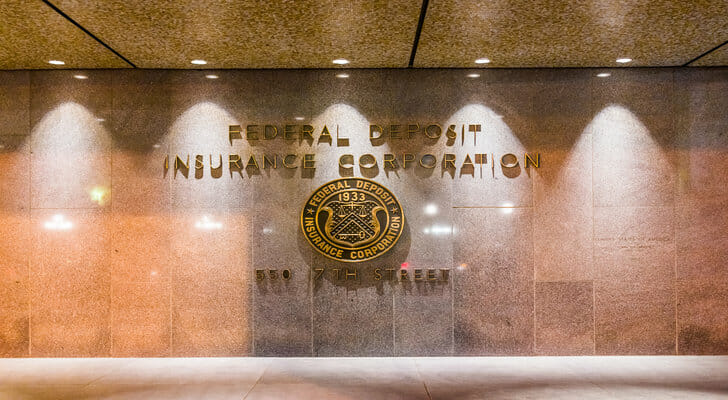Money market accounts work like a blend of a savings and a checking account. They come with the potential to earn higher interest rates, but may also let you write checks. Luckily, these accounts are FDIC-insured, which keeps your money safe in the event of a bank failure.
Consider working with a financial advisor as you explore ways to manage the more liquid portions of your portfolio.
Are Money Market Accounts FDIC-Insured?
Yes, money market accounts do receive FDIC insurance, up to the legal limit of $250,000. This limit applies on a per depositor, per account category and per bank basis.
This means that if your total balances in specific account categories ever reach higher than this limit at a certain bank, only the first $250,000 will receive FDIC coverage for each individual category. These categories include single accounts, joint accounts, trust accounts and corporate accounts.
You should note that these do not necessarily delineate between account type but rather by account ownership status.
What Does FDIC Insurance Mean?

The FDIC is an independent agency of the U.S. government that protects the money you place in a deposit account with a bank or other financial institution. This insurance is put into place to protect you and your money in the event that your financial institution should fail.
If your bank should fail, the FDIC will pay you insurance, usually within a couple of business days. The FDIC usually will open a new account for you at another insured bank with the same insured amount you had at the failed bank. The FDIC could also choose to send you a check for the insured balance you had in your account at the failed bank.
However, FDIC insurance does not cover identity theft or fraud.
NCUA Insurance for Money Market Accounts
Not all money market accounts are held with banks. Some instead are opened with credit unions, and this means a different form of insurance because the FDIC does not insure deposits with a credit union.
Instead, credit unions fall under the National Credit Union Administration (NCUA) insurance guidelines. This provides money market account holders with deposits insured up to $250,000 per depositor, per institution, per ownership category. Coverage is for single ownership accounts, including money market accounts, as well as both traditional and Roth IRAs.
There are a few key differences between FDIC insurance vs. NCUA insurance, however. Credit unions are owned by their members and thus, are regulated by the NCUA instead of the Federal Reserve like traditional banks.
How Do You Know If Your Money Market Account Is Insured?
The NCUA is the insurance provider for financial accounts held with credit unions.
The NCUA’s National Credit Union Share Insurance Fund insures up to $250,000 of your total deposits at all federal credit unions and most state-chartered credit unions.
If you have a federal credit union like USAA, NCUA insurance will insure your covered deposits. However, if you have a state-chartered credit union, you should ask it directly whether your deposits will be insured.
Money Market Accounts vs. Money Market Funds
Despite their almost identical names, money market accounts and money market funds are not the same thing.
A money market fund is a mutual fund rather than a deposit account. It allows you to invest in short-term debt securities, including US treasury bills. So while it offers the liquidity and low risk of a money market account, a money market fund is an investment product, not a deposit product, and therefore cannot receive FDIC coverage.
Other investment products that are not under FDIC insurance include:
- Annuities
- Mutual funds
- Stocks
- Bonds
- Government securities
- Municipal securities
Bottom Line

Money market accounts offer a great addition to your financial accounts for their flexibility and high interest rates. Some offer higher rates than even the best online savings accounts, which allows you to boost your savings even more. And with FDIC insurance, you’ll always know that your growing savings has a backup. Just keep the legal $250,000 limit in mind as your savings continue to increase.
Tips on Managing Your Money
- Nowadays, most banks qualify for FDIC insurance. Still, it’s important to double-check what kind of securities and protections your bank has in place. Since FDIC insurance doesn’t cover fraud or identity theft, you may also want to ask your bank how it will protect you in those events.
- If you have more than $250,000 in cash within the same account category, don’t forget that FDIC insurance doesn’t apply to the excess amount if it’s all at one bank. So to get the most coverage, consider opening a savings account or other deposit account at another FDIC-insured bank.
- If you want to set up a financial plan for the future, a financial advisor can help. Finding a financial advisor doesn’t have to be hard. SmartAsset’s free tool matches you with vetted financial advisors who serve your area, and you can have a free introductory call with your advisor matches to decide which one you feel is right for you. If you’re ready to find an advisor who can help you achieve your financial goals, get started now.
Photo credit: ©iStock.com/Rawpixel, ©iStock.com/krblokhin, ©iStock.com/marchmeena29
